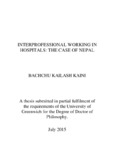Please use this identifier to cite or link to this item:
http://archive.nnl.gov.np:8080/handle/123456789/451Full metadata record
| DC Field | Value | Language |
|---|---|---|
| dc.contributor.author | Kaini, Bachchu Kailash | |
| dc.date.accessioned | 2018-05-10T05:19:01Z | |
| dc.date.accessioned | 2020-08-21T08:06:07Z | - |
| dc.date.available | 2018-05-10T05:19:01Z | |
| dc.date.available | 2020-08-21T08:06:07Z | - |
| dc.date.issued | 2018-05-10 | |
| dc.identifier.uri | http://103.69.125.248:8080/xmlui/handle/123456789/451 | - |
| dc.description | A thesis submitted in partial fulfillment of the requirements of the University of Greenwich for the degree of Doctor of Philosophy, 2015. | en_US |
| dc.description.abstract | Interprofessional working is an essential part of a health service delivery system. Effective delivery of health services relies on the contribution of health care professionals with different types of expertise. Interprofessional working occurs in all parts of the health system, but it occurs in different ways depending upon the organisational circumstances and the needs of service users. The aim of the study is to examine how health care professionals collaborate and to assess their perceptions of interprofessional working on health care delivery. This study discusses different sides of professional power, identity and autonomy between medical, nursing and allied health professionals. A power perspective of the theory of professions is followed in order to analyse different perceptions of professionals involved in this study. A qualitative research case study was used in this study. The fieldwork was conducted in three hospitals in Nepal by using a semi-structured interview schedule. Purposive sampling was used and, altogether, thirty-eight health care professionals participated in the research. The study suggests that interprofessional working is widely recognised and understood. Health care professionals also valued the relevance of interprofessional working despite the fact that it is a relatively new concept in Nepalese hospitals. This study finds that there were no significant differences found in interprofessional working practices between the three different hospitals in Nepal. It is also observed that interprofessional working is not sufficiently motivated amongst health care professionals and adequate support for it is lacking from all stakeholders. Nurses and allied health professionals are quite critical towards the role of medical professionals because they feel dominated and professionally isolated from the medical staff. In practice there appears to be various organisational, professional and interpersonal barriers such as lack of education on interprofessional care, interpersonal and communication skills. The study concludes with recommendations to improve interprofessional working in Nepalese hospitals. | en_US |
| dc.language.iso | en | en_US |
| dc.subject | Inter professional working--Hospitals--Nepal | en_US |
| dc.subject | Inter professional care | en_US |
| dc.title | Interprofessional working in hospitals : the case of Nepal | en_US |
| dc.type | Thesis | en_US |
| Appears in Collections: | 600 Technology (Applied sciences) | |
Files in This Item:
| File | Description | Size | Format | |
|---|---|---|---|---|
| Interprofessional Team Collaboration in Hospitals_ A Case Study of Nepal.pdf | 3.31 MB | Adobe PDF |  View/Open |
Items in DSpace are protected by copyright, with all rights reserved, unless otherwise indicated.